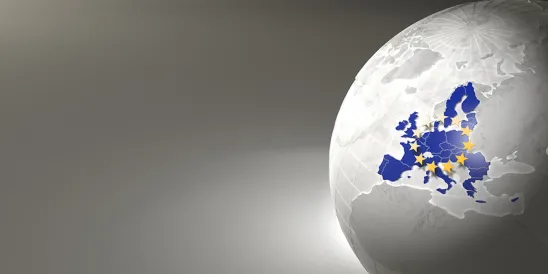On 17 June 2020, the European Commission published its White Paper on levelling the playing field as regards foreign subsidies. This policy paper proposes options for enabling the EU to control the use of foreign, non-EU subsidies that distort the EU Single Market and give subsidised firms an advantage over non-subsidised firms, for example, by facilitating the acquisition of EU businesses, by distorting the subsidised firms’ investment decisions, market operations or pricing policies, or by distorting bidding in public procurement.
If the proposals are adopted, they will put in place a regime that requires firms that are owned or backed by non-EU states to notify the subsidies they receive from those states to an EU supervisory authority (most likely the European Commission) and receive approval in advance of taking any steps that could distort the EU Single Market, in particular, by acquiring an EU firm, or bidding in an EU procurement process, or applying for EU funding.
These proposals are subject to consultation, which ends on 23 September 2020. If approved, they will be developed into legislation to be adopted in 2021, resulting in robust non-EU subsidy controls to complement the EU’s existing controls in competition law, trade defence measures, and foreign investment screening.
The options put forward in the White Paper are designed to create a level playing field in the EU Single Market by filling a regulatory gap. Subsidies provided by the EU Member States are strictly controlled under the EU state aids rules; those provided by non-EU governments are not subject to any EU controls. Commenting on the White Paper, EU Trade Commissioner Phil Hogan said: The EU is amongst the most open economies in the world, attracting high levels of investment from our trading partners. However, our openness is increasingly being challenged through foreign trade practices, including subsidies that distort the level playing field for companies in the EU. Along with other tools available at EU level such as foreign direct investment screening and trade defence measures, the White Paper is a welcome addition to the toolbox for our open, strategic autonomy.
The Commission proposes three “modules” for controlling foreign subsidies and a fourth measure to address the grant of EU funding to foreign-subsidised companies. Each involves the appointment of a supervisory authority, which is likely to be the Commission, although it may also involve the national authorities of the EU Member States.
- Module 1: general investigation and remedy powers. This module consists of a general legislative instrument designed for all possible situations in which non-EU subsidies could cause distortions in the EU Single Market. A supervisory authority (which would be the European Commission or a national authority of the relevant EU Member State) would have the power to act on any indication or information that a firm operating in the EU benefits from a foreign subsidy. If the subsidy is confirmed, the authority would then assess whether it has a positive impact and so satisfies an “EU Interest Test”, or a distortive effect, in which case the authority could impose a remedy, in the form of financial redress or structural or behavioural changes.
- Module 2: notifying subsidies before company acquisitions. The current COVID-19 crisis has in particular focused attention on a gap in EU controls over acquisitions of EU firms that have suffered a downturn in business and have become the target of acquirers that are owned or backed by non-EU states. This module addresses the issue by targeting foreign subsidies that facilitate the acquisition of EU companies either directly, by linking the subsidy to the acquisition or indirectly, by strengthening the acquirer’s financial position. It requires any company benefiting from a subsidy to notify a competent supervisory authority of any acquisition of an EU company above a defined threshold. The notification will have suspensory effect – the notified acquisition may not be closed until it has been investigated and cleared, either unconditionally (for example because it satisfied the EU Interest Test) or subject to commitments that remedy any concerns regarding distortion of the Single Market.
- Module 3: notifying subsidies before bidding in a public procurement process. The aim of this third module is to protect non-subsidised bidders in a public procurement process from being disadvantaged by below-market or below-cost bids submitted by bidders that benefit from non-EU subsidies. Bidders would be required to notify the contracting authority of any financial contributions from non-EU governments, and it would be for the contracting authority and the supervisory authority to decide whether a foreign subsidy has been granted and if so whether the bidder in question should be excluded from the procurement process.
EU funding: On the basis that all economic operators should compete on an equal footing for EU funding, the White Paper also puts forward a number of options to prevent foreign-subsidised companies from having an unfair advantage. These options include notification of the foreign subsidy to the granting authority.
The new controls are intended to apply to where any financial contribution has been made by a foreign government to an undertaking operating in the EU. The reference to financial contributions is intended to include interest-free loans, unlimited guarantees, capital injections, preferential tax treatment, tax credits and grants.
The EU has long been a staunch advocate of free markets; what has changed, however, is the EU’s confidence that, without taking more formal action, its trading partners will “do the right thing” (or refrain from doing the wrong thing).As such, it proposes putting in place robust regulatory powers to prevent its trading partners from taking advantage of the openness of the EU Single Market, often while keeping their home markets closed to EU investment. As in other areas of trade regulation (e.g., foreign investment screening), the EU is seeking to supplement the openness of the EU Single Market to non-EU firms with stronger protection for EU firms.
The specific controls proposed in the White Paper seek to address long-held concerns within parts of the EU that the openness of the EU Single Market – combined with the stringent EU state aid rules that prevent market-distortive subsidies being granted by EU Member States – enables non-EU states to tip the scales in favour of their home firms and so distort the EU Single Market. By subjecting non-EU subsidies to scrutiny and potential remedies, the EU seeks to protect the integrity of the EU Single Market and encourage its trading partners to reassess their subsidy regimes.
The Commission has a tradition of being agnostic as regards the origin of foreign investment into the EU. This is reflected in the White Paper, which states that the controls it proposes will apply equally to all non-EU subsidies and will not discriminate against any one country. While that may be the case, such controls may subject firms originating in jurisdictions in which state ownership or state backing is prevalent to more stringent scrutiny than firms originating in free market economies.
The White Paper proposals are by their nature general and will require detailed drafting to enable them to become law. The EU has not provided a firm timetable, but has said that it expects the new stricter regime envisaged in the proposals to be in place in 2021.








 />i
/>i

